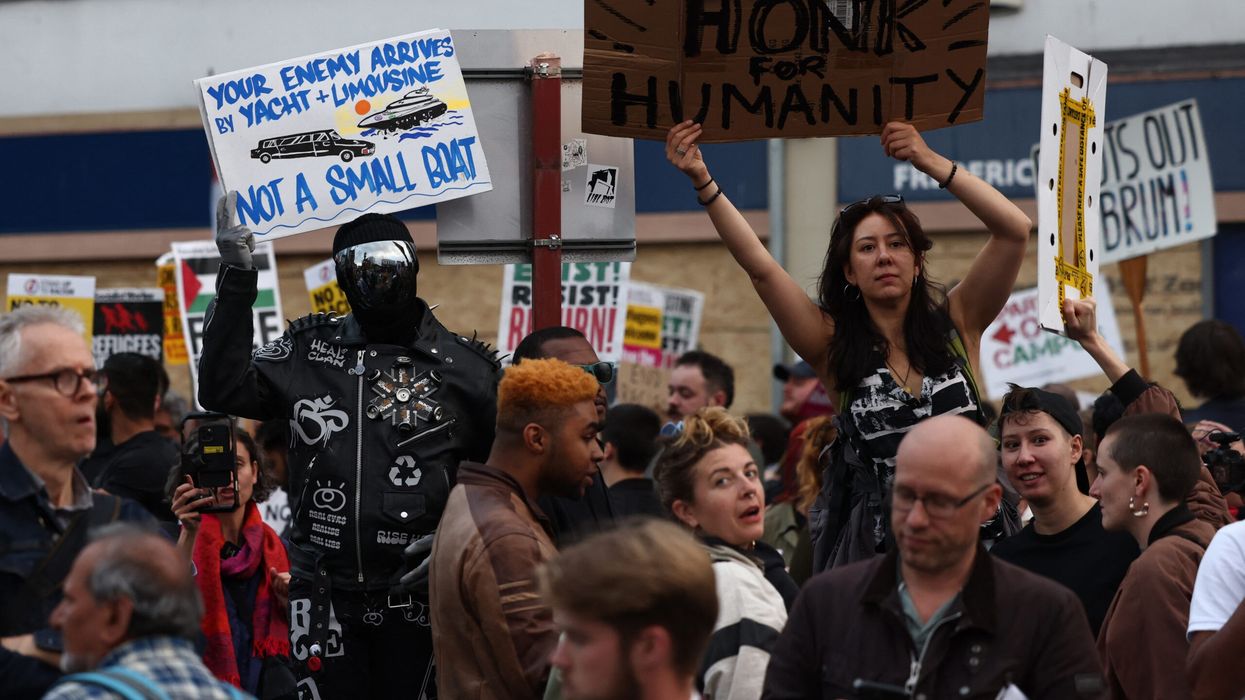THOUSANDS of anti-racism protesters gathered in several cities on Wednesday to oppose days of far-right violence, which had kept police on high alert.
Night riots, during which mosques and migrant-related facilities were attacked, erupted across towns and cities in England and Northern Ireland. These riots were fueled by misinformation surrounding the murder of three children on July 29.
On Wednesday evening, anti-racism and anti-fascist counter-protesters held rallies in various cities, including London, Birmingham, Bristol, Liverpool, and Newcastle.
"Whose streets? Our streets!" chanted protesters in Walthamstow, northeast London, where some held banners saying "Stop the far right." Sara Tresilian, 58, said, "I live in the borough and we don't want these people on our streets... they don't represent us. You have to turn out (and) give that message... I think it's important that you show up for your friends and neighbours."
Andy Valentine, the Met Police's deputy assistant commissioner, thanked "communities for coming together across the capital and for showing community spirit this evening."
In Sheffield, activists chanted "Say it loud, say it clear, refugees are welcome here," as riot police looked on. In Birmingham, hundreds of anti-racism protesters gathered outside a migrant support centre. In Brighton, around 2,000 people participated in a peaceful demonstration, according to police.
In Aldershot, police intervened between anti-racism activists and a group of people shouting "Stop the boats," referring to migrants crossing the English Channel. The government had 6,000 specialist police on standby to manage approximately 100 demonstrations by far-right activists and counter-protesters.
Home secretary Yvette Cooper thanked "all the police officers working tonight to protect & support local communities" in a social media post.
Tip of the iceberg
Courts have started ordering jail terms for those involved in the unrest as authorities seek to prevent further trouble. The disorder, the worst since the 2011 London riots, has led to nearly 430 arrests and over 120 charges, prompting several countries to issue travel warnings for the UK.
The violence began after three girls, aged nine, seven, and six, were killed, and five other children were critically injured during a knife attack at a Taylor Swift-themed dance class in Southport, northwest England. False rumours on social media initially claimed the attacker was a Muslim asylum seeker. The suspect was later identified as 17-year-old Axel Rudakubana, born in Wales, with parents from Rwanda.
Riots followed, with demonstrators throwing bricks and flares at police, burning cars, and attacking mosques and hotels used for asylum seekers. Keir Starmer warned that anyone involved would face "the full force of the law," including those inciting violence online. He pledged "substantive sentencing before the end of this week" for rioters, with the government freeing up an extra 500 prison places.
Scores of accused individuals, including teenagers, have already appeared before judges. On Wednesday, a man was jailed for three years after pleading guilty to violent disorder and assaulting a police officer in Southport. Two other men received sentences of 20 months and 30 months for participating in violence in Liverpool on Saturday.
"The three men sentenced today are the tip of the iceberg, and just the start of what will be a very painful process for many who foolishly chose to involve themselves in violent unrest," said prosecutor Jonathan Egan.
EDL blamed
Police have blamed the disorder on figures associated with the now-defunct English Defence League (EDL), a far-right Islamophobic organisation linked to football hooliganism. EDL founder Tommy Robinson has been accused by authorities of stoking tensions. Police in Cyprus, where he was reported to be on holiday, said they were ready to assist if needed. Robinson later wrote on the X social media platform: "Lucky I'm not in Cyprus then."
The rallies were advertised on far-right social media channels under the banner "Enough is enough." Lawmakers have accused social media sites of fueling the violence. Tech billionaire and X owner Elon Musk has angered the government with a series of provocative tweets, including one stating that a British "civil war is inevitable."
(With inputs from AFP)




